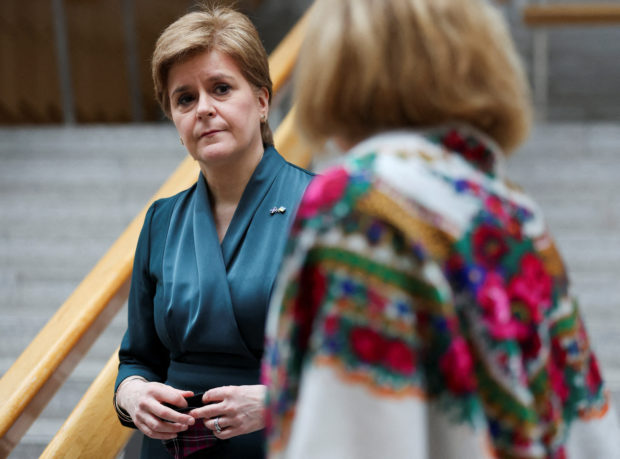Scotland in formal apology to women killed as witches

Scotland’s First Minister Nicola Sturgeon (L) launches Ukraine Humanitarian Appeal with outside parliament in Edinburgh on March 3, 2022. | PHOTO: RUSSELL CHEYNE / POOL / AFP
EDINBURGH — Scotland’s government marked International Women’s Day on Tuesday by issuing a formal apology to thousands of women who were executed centuries ago in a mania against witchcraft.
Between the 16th and 18th century, some 4,000 people were accused of witchcraft, according to the group Witches of Scotland, which has been campaigning for the apology.
In total, more than 2,500 people were executed, four-fifths of them women. They were mostly strangled and then burned, after making confessions that were often extracted under torture.
Addressing Scottish lawmakers, First Minister Nicola Sturgeon said it was “injustice on a colossal scale” that was “driven at least in part by misogyny in its most literal sense — hatred of women”.
“At a time when women were not even allowed to speak as witnesses in a court, they were accused and killed, because they were poor, different, vulnerable or, in many cases, just because they were women,” she said.
Article continues after this advertisement“I am choosing to acknowledge that egregious, historic injustice and extend a formal posthumous apology to all those accused, convicted, vilified or executed under the Witchcraft Act 1563.”
Article continues after this advertisementWitch hunts were enthusiastically promoted by Scotland’s King James VI, who became also King James I of England in 1603.
His obsession found voice in William Shakespeare’s “Scottish play”, featuring three witches who lead Macbeth to his doom.
Sturgeon noted some critics had queried the point of an apology centuries later, but said “it might actually be pertinent to ask why it has taken so long”.
“Acknowledging injustice, no matter how historic, is important,” she said, noting too that Scotland had formally apologised to men convicted for being gay before homosexuality was legalized by the UK in 1967.
RELATED STORIES
Killed for witchcraft, Scotland’s forgotten victims find a voice
Spain region to rehabilitate memory of executed ‘witches’
The witches at the ‘Gates of Hell’: Norway’s darkest hour